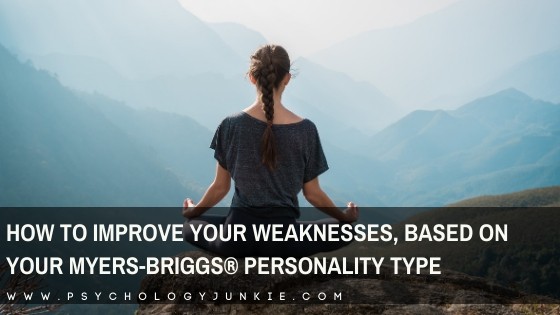How to Improve Your Weaknesses, Based on Your Myers-Briggs® Personality Type
Do you ever feel like you keep falling into the same traps over and over again? Perhaps you have AMAZING ideas, but you constantly leave them half-finished. Maybe you’re excellent at creating stability and getting things done, but you’re anxious about change. Today we’re going to look at the most common weaknesses for each personality type and some ways you can get stronger in those areas. We’re also going to give you some types that can be possible mentors for you while you work on those weaknesses!
Some Notes Before You Begin:

- Work on developing your weaknesses during times of low stress. If you’re stressed, doing these activities will only make you feel more stressed.
- When choosing a “mentor” or guide, pick someone you trust – maybe a family member or life-long friend.
- Be sure to have some people with similar types to your own in your “circle.” This will help you to recognize your strengths and not feel like a “fish-out-of-water” when you’re dealing with the opposite type.
Not sure what your personality type is? Take our new personality questionnaire!
How to Improve Your Weaknesses, Based on Your Myers-Briggs® Personality Type
ENFPs and ENTPs
Strongest Mental Process: Extraverted Intuition
Weaker Mental Process: Introverted Sensation
Weaknesses: These two personality types tend to struggle with creating routine, stability, and structure. They are so focused on new and novel pursuits that they tend to leave a lot of projects half-finished. They can also be so mentally-focused on ideas and theories that they lose touch with their physical needs (adequate sleep, nutrition, doctor’s check-ups, etc,.)
Mentors Who Can Help You: Any Sensing-Judging personality types. Keep in mind, you also might clash because you naturally excel at the other person’s weakness (and vice versa). Try to see each other’s differences and appreciate them rather than be “triggered” by them. Remember that you can help Sensing-Judgers with their weaknesses as well!
A few simple practices that can help:
- Set reminders on your phone to drink glasses of water throughout the day. This way you don’t have to worry about forgetting to drink.
- Once a week “strew” healthy snacks in places where you naturally spend a lot of time. A bag of almonds in the car, fresh fruit and vegetables at home, granola bars in your bedside table, etc,. This way you have healthy food to eat whenever you’re spontaneously feeling hungry.
- When you find yourself starting to brainstorm new ways of doing something, see if you can recall ways that have worked well in the past. Is doing this in a new way really necessary?
- Think about the activities in your life that you could simplify by turning into regular routines and habits. Once you have a routine in place, you expend less energy because it because automatic. Try creating a new routine each month and sticking with it for the entirety of the month (by which point it should become more habitual). Think of ways to make the routines fun (for example, listen to a favorite podcast while washing dishes, pay your bills by candlelight, dance to your favorite tunes while cleaning the house).
Read This Next: Here’s How Much of a Risk-Taker You Are, Based on Your Personality Type
INFJs and INTJs
Strongest Mental Process: Introverted Intuition
Weaker Mental Process: Extraverted Sensation
Weaknesses: These two personality types tend to struggle with the details of their surroundings. They are so focused on reading-between-the-lines and seeing hidden meanings that they may bypass what’s directly in front of them. Quickly adapting to their environment can be very difficult for them and they may get very stressed when called upon to act spontaneously or improvise. They also can be so focused on distant future realities that they lose sight of what’s happening right now.
Mentors Who Can Help You: Any Sensing-Perceiving personality types. Keep in mind, you also might feel a little uncomfortable at first around each other because you’re wired so differently. Try to appreciate each other’s differences and see what you can learn from them.
A few simple practices that can help:
- Practice tuning into your senses. Chew your food more slowly, savoring each flavor and texture. Listen to music and pay attention to the sound rather than the meaning of the words. Look around you and see which things excite your senses – engage with those things in some way.
- When you’re around friends or family members, try to stay tuned into the “here-and-now” as much as you can. Actively listen, try taking things at face value, and appreciate the details of the moment you’re living in.
- Find a sport or recreational activity that you enjoy (even if you’re not especially good at it). Try making it a routine to practice it at least once a week. Practice becoming “one” with your environment as you do so. Let yourself fully inhabit your body and respond to the world around you. Go easy on yourself if you struggle initially or seem clumsier than you want!
Read This Next: Here’s What Makes You Dangerous, Based on Your Personality Type
ESFPs and ESTPs
Strongest Mental Process: Extraverted Sensation (Se)
Weaker Mental Process: Introverted Intuition (Ni)
Weaknesses: These two personality types are so in touch with their environment and so quick to respond that they can forget to evaluate the long-term implications of their actions. They may get so fixated on the details of their environment and the activities happening around them that they forget to look deeper for underlying themes, patterns, and meanings.
Mentors Who Can Help You: Any Intuitive-Judging (NJ) personality types. Keep in mind, you also might feel a little confused around each other at first because you’re wired so differently. Try to appreciate each other’s differences and see what you can learn from each other.
A few simple practices that can help:
- Imagine your life without limits and roadblocks. What would that life look like? Write down ways you could make that life closer to reality and ways you could attain that life.
- Spend some time each day in a quiet place (make sure your phone is turned off). Let yourself be “bored.” Let your mind wander without direction or constraints. What do you imagine? Do you get any insights that you can apply to your life?
- Think about a goal you are working towards. How can you get there faster?
- As someone tells you a story or relays an experience, try to see the intention behind their words. Why are they telling you this? What inner need is driving them to explain the story this way? Are there other perspectives they might be missing?
ISFJs and ISTJs
Strongest Mental Process: Introverted Sensation (Si)
Weaker Mental Process: Extraverted Intuition (Ne)
Weaknesses: These two types commemorate special moments and establish positive routines and habits. However, they can be skeptical of change and become stuck in their routines to the detriment of their own development. They can be anxious when change shows up on the horizon. They can also discount their own imaginative ideas, seeing them as too “out there” when they might actually be good ideas.
Mentors Who Can Help You: Any Intuitive-Perceiving (NP) personality type. Remember, you might experience some clashes with these types because you both are so different. Your strengths are their weaknesses and vice versa. But be patient, you both have a lot to learn from each other!
A few simple practices that can help:
- When you get a feeling that “something is wrong here,” but you can’t figure out what it is – pause and rest with that feeling. What could be giving you that feeling? Are there any patterns that you’re picking up on that you can only realize with patience?
- Look at any bad habits in your life. How can you use innovation to break that habit? Is there a new way of looking at a solution that would help you to be more motivated?
- One time a day, try to stop yourself before taking action and consider if there are any alternative actions you could take.
- Look at a situation that’s “bad” in your current life. How could you re-frame that situation to see it in a more positive light?
ESTJs and ENTJs
Strongest Mental Process: Extraverted Thinking (Te)
Weaker Mental Process: Introverted Feeling (Fi)
Weaknesses: These two types focus on using objective logic to make decisions and achieve goals. They are hard-working, task-oriented, and direct. However, they can disregard their personal feelings and values to achieve superficial gains. This can result in them chasing after goals without getting true satisfaction. It can also mean that they are condescending to the emotional needs and values of others.
Mentors Who Can Help You: Any Feeling-Perceiving (FP) personality type. Remember, you might experience some clashes with these types because you are both wired differently. Just be patient with the awkwardness (if there is any) – If you are open-minded, you can both learn a lot from each other!
A few simple practices that can help:
- List three things that you would dedicate your life to, or even die for. Don’t worry about what other people think or what you would achieve. What are these values? How can you tailor your life towards these values?
- When you’re listening to someone speak, identify the values they are defending or expressing. How can you respect those values?
- Each time you make a decision, pause and consider whether this decision is in line with your values and personal ethics.
- When you sense that someone is in need of emotional support, move yourself to sit by them. Ask them what’s wrong, if everything is okay, and practice just “being” with them without offering advice. After they’ve fully expressed their struggles you can ask them if they’d like any help in coming up with solutions. But be careful – sometimes when people are stressed solutions only cause more stress.
ESFJs and ENFJs
Strongest Mental Process: Extraverted Feeling (Fe)
Weaker Mental Process: Introverted Thinking (Ti)
Weaknesses: These two types are deeply in touch with the values of the people around them. They seem to innately know what people need or want in any given situation. However, they can also struggle with impersonally assessing a situation. They may be so focused on making everyone happy that they lose sight of what makes the most logical sense for them personally.
Mentors Who Can Help You: Any Thinking-Perceiving (TP) personality type. Keep in mind; you might misunderstand each other sometimes. You’re both wired very differently. Their strengths are your weaknesses, and vice versa. Be patient – you can be some of each other’s best inspirers and motivators if you give it time!
A few simple practices that can help:
- Examine your behaviors, beliefs, and values. Look at the roots of those beliefs – which “truths” do you follow that might have irrational or disconnected logic? Is there any way you can verify the accuracy of those things?
- Write an article or have a conversation where you focus on using the most precise words or phrases possible. Eliminate unnecessary words or “filler.” Keep in mind, people who know you well might assume you’re angry at them because it’ll be a departure from how you typically speak. Maybe try this with a trusted friend who knows what you’re practicing.
- The next time someone makes an illogical argument, look for ways that people are conflating two things that are actually separate. Ask them to explain how the two things relate.
- Examine a puzzle, brain-teaser, or strategy game and see if you can figure out the underlying process and logic behind the game.
ISTPs and INTPs
Strongest Mental Process: Introverted Thinking (Ti)
Weaker Mental Process: Extraverted Feeling (Fe)
Weaknesses: These types have a knack for discerning underlying frameworks and models. Although their analytical abilities are strong, they can struggle to understand the values of the people around them. They may fail to understand where others are coming from and can seem tactless or insensitive when they don’t mean to be.
Mentors Who Can Help You: Any Feeling-Judging (FJ) personality type. Keep in mind; you might have some clashes over time because you are wired differently. But remember that you can also be each other’s biggest encouragers and teachers.
A few simple practices that can help:
- People watch. Notice the ways people interact with each other; the body language they use to express themselves, the things that make them happy or cause a negative reaction.
- Play the “question game” with people and use this opportunity to get to know them through self-disclosure. Ask, and answer, personal questions like, “What makes you happy? What makes you sad?” A game like The Ungame can help you come up with questions.
- When you’re in a group of people, look around to see if anyone seems excluded. Try to imagine ways to include them.
- Take some time each day to text, email, or speak to someone and ask how they are doing.
ISFPs and INFPs
Strongest Mental Process: Introverted Feeling (Fi)
Weaker Mental Process: Extraverted Thinking (Te)
Weaknesses: These two types are regularly exploring their values, desires, and individual ethics. However, they can struggle to put their values into a tangible plan of action. Achieving objectives, structuring their time, and focusing on objective logic extensively can be exhausting for them. They may struggle with confidence when it comes to pursuing their goals.
Mentors Who Can Help You: Any Thinking-Judging (TJ) personality type. Keep in mind, these types can seem harsh and insensitive sometimes to you – it is usually unintended. Their strengths are your weaknesses, and vice versa. Be patient and understanding – with time you can be some of each other’s greatest motivators!
A few simple practices that can help:
- Have a conversation with someone who doesn’t support a conclusion or cause of your own. Listen without taking anything personally. Pause and consider their answers – can you disprove them logically? Are they logically sound? Are there any inconsistencies in their logic that you can point out? Are there any inconsistencies in your own logic? Try to do this with someone who won’t be easily offended (the most helpful type would probably be a TJ type).
- Think about the parts of your day that are inefficient. Pick one highest-priority part to focus on. Look for the most efficient way you could streamline that part of your day (ask your mentor for help if needed). Try following that efficient method daily.
- Practice doing “If, then” exercises to predict the outcomes of various actions. For example, “If I eat a healthy breakfast this morning, I will feel more creative and happy today.”
- Think of an area in your home or vehicle that you could reorganize. Think of how you could maximize the space in that area and logically determine the best way to organize it.
Read This Next: Here’s a Quote You’ll Instantly Relate to, Based on Your Personality Type
What Are Your Thoughts?
Did you enjoy this article? Do you agree or disagree with it? Let us know in the comments!
Find out more about your personality type in our eBooks, Discovering You: Unlocking the Power of Personality Type, The INFJ – Understanding the Mystic, and The INFP – Understanding the Dreamer. You can also connect with me via Facebook, Instagram, or Twitter!
Subscribe to Our Newsletter

Want to discover more about personality type? Get the inside scoop with Susan Storm on all things typological, along with special subscriber freebies, and discounts on new eBooks and courses! Join our newsletter today!

















I think developing the inferior function must be a natural process, and after the tertiary function is developed. Otherwise it will only cause stress. I have been developing my inferior Se for 8 years now and sometimes I just can’t draw, then I need to stop and go back to it later. I have stopped in the supermarket today I started to daydreaming on a subject because I needed a rest from the reality. It is hard. 🙂
I agree about the stress part. If I am comfortable in my own skin as I am then why should I attempt to be someone I am not?
Love this!
What personality type would you say are the most likely to make good marriage partners?